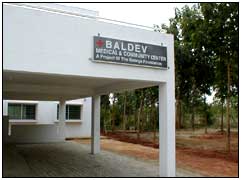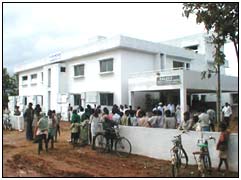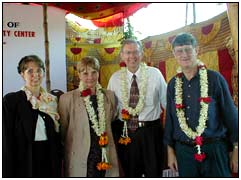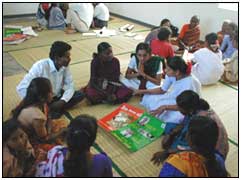 |

baldev medical & community centre

the community we serve

the Caldwells with Barbara Crossette &
David at the inaugural ceremony

Social worker Narayanappa with sangha members
|
BALDEV MEDICAL AND COMMUNITY CENTRE
Background of the Project
Krishnagiri district of Tamil Nadu has been identified as the most backward
district in terms of health and development. Located in the rain shadow
belt of Tamil Nadu, the rocky terrain does not lend itself to agricultural
prosperity, and the rural communities are solely dependent on the scanty
rainfall for farming activities. The specific area chosen to establish
the Health Centre is remote and is situated about 10 kms. away from the
nearest primary health centre. Infrequent and irregular public transport
systems hinder any quick access to emergency health services. Education
facilities are limited to government primary schools, with the nearest
high school also located around 10 kms. away.
Large sections of the communities in this area belong to the scheduled
and backward groups. These persons are largely landless laborers who have
no fixed assets. There are not many non-farming occupations in this area.
Poverty is rampant.
Diseases such as communicable diseases, respiratory infections, tuberculosis
and leprosy are widely prevalent. Anemia and malnutrition is seen in more
than 75% of women and children. Chronic illnesses lead to loss of precious
human-hours and income. Other problems such as alcoholism, spouse and
child abuse are consequences of poverty and ignorance.
In Krishnagiri district alone the quality of life indicators are:
1. Infant mortality rate : 85 / 1000
2. Total literacy rate : 39.6%
3. Percentage of families below Poverty Line : 42%
4. Cultivators : 49.2%
5. Agricultural landless : 34.6%
A very unique and widely documented feature of this district is the prevalence
of female infanticide. Despite efforts of the government, there has not
been much positive impact in curtailing this practice.
Being a backward area and situated on a State border, this block tends
to be marginalized from mainstream political interventions. Local panchayat
bodies have been set up, but they are not proficient enough at the moment
to ensure good governance. Women are poorly represented in the political
framework.
There has been no attempt by any government primary health centre to store
and manage accurate health data on a permanent basis. Most of the data
available is focused on immunization, family planning and a few chronic
diseases.
All these issues are bound to increase if unchecked. The vicious cycle
of poverty, illiteracy leading to malnutrition and infection, in turn
leading to further poverty needs to be broken without further delay.
The local communities have been involved in all the projects of The George
Foundation right from the planning stage. In our health initiatives too,
the communities have participated in the pre-planning discussions and
needs analysis. They have also contributed towards labour in the development
of infrastructure required for this project. Local government bodies such
as the panchayat members are actively involved in motivating their communities
to utilize the proposed facilities and practice the health messages they
receive.
Baldev Centre is a three-level building with approximately 16,000 sq feet
floor area. The ground floor area is devoted to outpatient clinics, and
comprises rooms for EDPS registration, examination/treatment room, doctor's
office, laboratory, pharmacy, administrative section and training classroom.
Great care has been taken in the design to facilitate an efficient workflow
through the outpatient section. The second level, connected to the ground
floor by both a staircase and a ramp, has the inpatient ward, labour room,
minor operation theatre and recovery rooms. Up to 10 inpatients can be
kept at a time. The third floor has residential quarters for the doctors,
nurses and other staff.
An administrator, a resident nurse and a trained social workers operate
this centre. It is being equipped with infrastructure to provide primary
healthcare, as well as emergency care, and community services. Baldev
has the potential to become the coordination and surveillance centre for
all PHCs that maintain patient records using the EDPS2000 system.
|






























